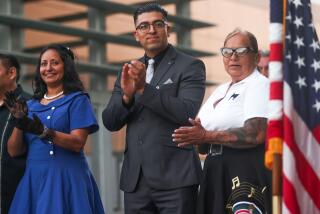The Arguments for--and Against--a Run by Molina for Mayor
It didn’t take long for the glow of my maiden column last week to wear off. Followers of the L.A. Dodgers and the minor-league Hollywood Stars tracked me down shortly after dawn on the morning of my debut to harangue me. I listened politely but I was unmoved. I still don’t like the Dodgers and the Stars.
They weren’t the only ones to jar me out of a sound sleep. Supporters of Gloria Molina called too.
They were happy to read that a Latino would be expressing opinions and observations about post-riot L.A. in these pages. But they were more interested in a brief comment that I slipped in at the end of the column: “Gloria Molina shouldn’t run for mayor of L.A.”
They disagreed with me.
“What have you got against the most popular Chicano politician in Los Angeles?” one Latina friend began. “You being a Chicano from East L.A., you more than most people should get behind her. In the wake of the riots, the city needs good leadership. Here’s someone from our community who can lead. She’s the best Latinos can offer the city.
“And,” the Molinista added with emphasis, “she can win .”
Molina is a strong-willed politician who has become the most important Latino officeholder in town. She assumed the title from Edward Roybal, who is retiring from Congress after 43 years in public life. She made it to the top despite being told it was a mistake to buck the wishes of Richard Alatorre, Art Torres and other Latino political powers.
Three times in the last nine years, she beat the odds. She made it to the Assembly in 1982 and to the L.A. City Council in 1987, ignoring advice that she should have waited “her turn” to run for such highly visible offices. Then, last year, she defeated Torres, her one-time mentor, in a divisive Los Angeles County supervisorial race.
Now, with Tom Bradley stepping down after 20 years as mayor, the temptation is there to go for it. Many Molina supporters say it’s time for one of our own to lead Los Angeles, where Latinos make up 40% of the city’s 3.2 million residents. The early signs seem encouraging for Molina--two opinion polls on next year’s mayoral race give her the highest name recognition among the hopefuls.
But wait a minute. Not so fast.
There are some good reasons why Molina should not run for mayor, I told the callers.
First, she hasn’t been a county supervisor for even two years; it’s way too soon to suddenly jump into a mayoral campaign. There’s more than enough fat, laziness and insensitivity in county government to keep Molina and her “hold-the-rascals-accountable” approach busy for the next decade.
She railed against the involvement of the Sheriff’s Department in suspicious shootings. She blasted salary bonuses for ranking county officials. She lobbied to trim a bloated county budget. She cajoled the bureaucracy into steering more business to deserving firms owned by women and ethnic minorities.
Many times, she’s been a lonely voice. That may change with Tuesday’s election, which is why she should stick around. Look at the issues she could affect.
For openers, the unincorporated territory of East L.A., an important center of Latino population, remains a stepchild of county government. After three failed attempts at cityhood in the 1960s and 1970s, the county let Monterey Park and Commerce annex the area’s choicest housing and industrial sections. Since then, county officials have shown little interest in setting an agenda for the area.
It’s time for Molina to help decide what’s next for East L.A.--whether, for example, it should be annexed to the city of Los Angeles.
Consideration ought to be given to the wider impact Molina can have in county circles. She is said to be keenly interested in whether the county chief executive proposal on Tuesday’s ballot passes. If so, the chance to guide greater L.A. as the “county mayor” could be more inviting than being L.A.’s mayor.
Then there’s the thorny problem of tensions between Latinos and blacks. The increased political power anticipated for Latinos, largely based on growing population, may come at the expense of African-Americans. As a mayor who happens to be Latino, Molina may find that her administration will be hamstrung from the beginning by an angry black community unwilling to make concessions to Latinos.
The Molinistas weren’t impressed by my reasoning. They countered each point I made with one of their own, including the importance of becoming the first woman mayor in L.A. history. That’s an argument I can’t disagree with.
I also can’t disagree with much of what Molina has done so far in public life. I just hope she’s not into the Dodgers or the Hollywood Stars.
More to Read
Sign up for Essential California
The most important California stories and recommendations in your inbox every morning.
You may occasionally receive promotional content from the Los Angeles Times.










